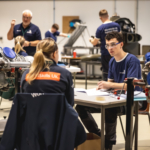‘For too long, we’ve had too many of our young people leaving school without the necessary skills or direction… I am determined to change this’. In his recent speech, the Education Secretary in England, Damian Hinds, made a vitally important contribution to the case for a new and better approach towards technical education. As important as the policy announcements Damian made was the philosophy he set out to combat the decades’-old attitudes that too many people have had towards non-academic routes across the UK. In particular, he rightly called out one of the central issues: ‘as a nation I’m afraid we’ve been technical education snobs’. For whatever reason, there is a prevailing attitude amongst many parents that going to university for three years to read an academic degree is something for their children to aspire to, whilst options that offer a technical route are what Damian calls ‘OPC courses’: for ‘other people’s children’. Changing attitudes is going to be part of a ‘ten-year project to upgrade our nations’ skills’ – which is vital for ongoing economic success – and this means governments across England, Wales, Scotland and Northern Ireland pulling in the same direction. To succeed in putting skills development at the heart of economic and industrial strategy means addressing the ‘three Ps’: prestige, parity-of-esteem and productivity – and here’s how we and our partners are contributing.
When you witness the celebration that is the medals ceremony of our skills competitions National Finals held at WorldSkills UK LIVE every year, you are experiencing the dictionary definition of ‘prestige’. The best and most talented technically-minded young people from every UK nation being rewarded for months of hard work and training in the full range of technical skills. This not only gives young people the opportunity to put on their CVs that they’re the best in the UK; with the potential of a place on Team UK, the bona fide fast-track route to a well-paid, long-term career, the label of ‘world-class’ is in reach too. The young people who performed so brilliantly at LIVE last month could soon embark on a journey that will take in the European skills championships in Austria in 2020 and then the splendour of the Skills Olympics in Shanghai, China a year later. If there is any point of prestige higher than a medal at the world’s biggest event for young people in technical training then I have yet to find it. Major countries from France, to Russia, to South Korea are investing more and more in their skills systems each and every year as they fully grasp just how powerful a message it sends to be at the top of the Skills Olympics medals table. If we are serious in this country about the transformation of technical education, we need to match the ambition with investment befitting of a top five global economy and the belief we have in our young people. And we will be doing even more to raise the profile of our work, showcasing such excellence and creating ever more successful role models for others to emulate.
If the answer to prestige is staring right at us, the question of the second ‘P’, parity of esteem, is perhaps more difficult to crack. As Damian said in his speech, ‘Government can’t endow esteem on technical education, you can’t legislate for parity in this way’. Regrettably, this is true, but what we can do is shift the dial in terms of perceptions. Our experience at WorldSkills UK is really instructive here. At our LIVE event, the UK’s biggest skills and careers exhibition held at the NEC every November, we are able to offer the most wide-ranging showcase for technical education. In our Future Tech zone we worked with partners including Amazon, Apple, Facebook, BAE Systems, Rolls Royce and others to showcase the very latest in Fourth Industrial Revolution thinking and practice. Not only does this demonstrate to young people that a career in mechanical engineering or cyber security is every bit as exciting as one that involves academic study, it also brings home to parents that these are routes that they should be proud of their children following. Our research shows that after visiting our event, 97% of parents say they will undertake some kind of follow up activity with over 75% citing both researching technical careers and talking to their children about apprenticeships. It really does show how seeing is believing – and we are working to ensure even more people can engage with our work digitally as a means of helping change more parental hearts and minds.
The reason we want perceptions of prestige and parity of esteem to be transformed is to generate the third ‘P’: productivity. The more young people we can encourage to pursue technical-based, rewarding and long-term careers in the areas of greatest economic need, the better our chance of ramping up the UK’s troublesome record on productivity. As Damian rightly pointed out: ‘we cannot rely on a growing number of workers keeping our economy growing – employment is already at record levels and we’re seeing less inward migration’. What we need to do in the context of Brexit is boost the training opportunities for young people to develop more home-grown talent. But we also need to ensure we couple it with a tried and tested formula to unlock productivity gains. At WorldSkills UK we are currently developing a Productivity Lab that aims to do achieve exactly that. This will be the place where we bring together the knowledge and best practice that underpin our medal-winning success internationally and demonstrates what we and the businesses we work with know to be true: training to compete in skills competitions raises quality standards and boosts productivity. The Lab will be the place to come to for best practice in world-class productivity.
Outdated and misguided perceptions about technical education can no longer go unchallenged. Our future economic success relies on tackling head on technical education snobbery. Through our work at WorldSkills UK with governments across England, Scotland, Wales and Northern Ireland, with businesses and with the skills sector, we will keep pushing to ensure that more and more young people have the opportunity through technical education to succeed in work and life.


